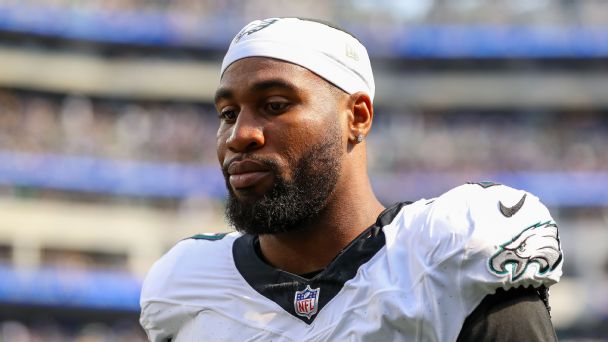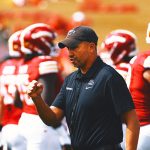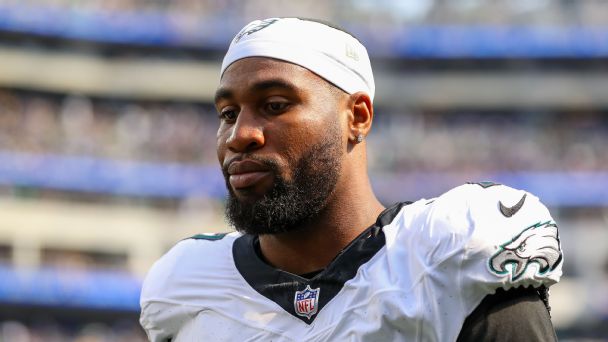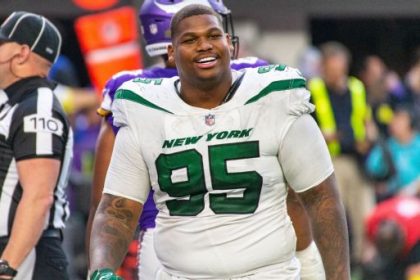
FLORHAM PARK, N.J. — So let’s take a look at how this played out.
1. Team acquires Pro Bowl player in a trade.
2. Player says he’s thrilled to be on the team.
3. Player downplays his desire for a new contract, precisely the reason why his previous team decided to part with him.
“Whatever happens, I’m going to be happy,” edge rusher Haason Reddick (the player) said in his introductory news conference with the New York Jets. “I’m going to give my all, no matter what. That’s just who I am as a person.”
Four months later, player doesn’t show up for training camp — the rarest of holdouts.
It’s highly unusual for a player to stay away from his new team after being acquired in a trade, but here we are. Reddick, due to make a non-guaranteed $14.25 million in base pay in the final year of his contract, has missed 15 days of training camp, accumulating $850,000 in mandatory fines (including minicamp) and approximately $300,000 in discretionary fines.
How did this happen? Neither side is commenting, but let’s try to paint a picture.
What makes this so strange is the Jets had communicated with Reddick’s camp before the trade was finalized, as they had received permission from the Philadelphia Eagles to do just that. In theory, the Jets and Reddick should’ve been on the same page regarding his contract situation, particularly since there were warning signs. It was known throughout the NFL that Reddick wanted a contract that would make him one of the highest-paid edge rushers.
The Jets should’ve executed a deal with Reddick before making the trade or, at the very least, established parameters, two agents not affiliated with Reddick told ESPN. One agent said he’s “super surprised” they didn’t have an agreement in place with Reddick. The other agent said, “You don’t do a trade until you know what the parameters are.”
They did offer to extend his contract at the time of the trade, ESPN previously reported. It’s not clear how much they offered, but it likely came up well short of what he’s seeking in guaranteed money. The Jets saw it as a good-faith gesture, but a former NFC general manager said Reddick might have interpreted it differently.
“They might have insulted him, too,” he said. “Now he’s an angry camper.”
At this point, the Jets’ likely preference is wait until during the season, or after, before revisiting a long-term extension. Reddick is thought to be seeking about $25 million per year; he might be targeting Danielle Hunter‘s deal with the Houston Texans — two years, $49 million, including $48 million fully guaranteed.
Hunter and Reddick are close in age (both turn 30 during the season) and have the identical sack production over the last two seasons (27 apiece). One difference: Hunter was a free agent this offseason; Reddick wasn’t.
The Jets believed they were clear and direct with Reddick’s camp. They were under the impression he’d go to training camp under his existing contract, according to a previous ESPN report. It’s fair to wonder: Why would Reddick agree to the trade if he was troubled by the Jets’ position on his contract. He didn’t have a no-trade clause, but he certainly could’ve raised a red flag, dissuading the Jets from completing the swap.
Of course, the Jets could’ve signed Reddick to a fair-market extension at the time of the trade — say, three years, $75 million. Teams sometimes do that when they trade for a star player.
This offseason, the Texans reworked wide receiver Stefon Diggs‘ contract and extended running back Joe Mixon — acquired in separate trades. The Cleveland Browns traded for wide receiver Jerry Jeudy and, in the process, gave him a huge deal. The New York Giants and Tennessee Titans signed pass rusher Brian Burns and cornerback L’Jarius Sneed, respectively, to monster contracts after acquiring them in tag-and-trade scenarios. Both had the franchise tag.
“I’d pay him,” the former GM said of Reddick, who ranks fourth in sacks (50.5) over the last four seasons. “I know he’s 30, but he’s a top-five edge rusher, and those are hard to find. I don’t know why they didn’t sign him. Why did you put yourself in this hand basket?”
Jets general manager Joe Douglas is conservative when signing older players to long-term deals. Then again, he hasn’t had too many players — old or young — of Reddick’s caliber. He didn’t have to give up a ton of compensation to the Eagles — a 2026 conditional third-round pick — so it’s possible he’s prepared to live with a one-and-done situation. That could be the outcome, though it’s quite likely Douglas will have to sweeten his 2024 compensation to end the stalemate.
“I understand why Joe doesn’t want to pay him,” a third agent said. “[Reddick] is a little long in the tooth, and he’s already paying [Aaron] Rodgers, and he has all those young players coming up.” Cornerback Sauce Gardner, wide receiver Garrett Wilson and running back Breece Hall will be eligible for contract extensions in 2025.
The Jets removed Reddick’s base salary from their salary cap by placing him on the reserve/did not report list at the start of camp, increasing their cap space to almost $20 million, according to Over The Cap. If he reports under his existing contract, he immediately counts $15 million, leaving a few million in wiggle room.
Another factor could be at play, as there is a sense in the agent community that Jets owner Woody Johnson wants to keep everything short term.
Johnson voiced his displeasure with last season’s 7-10 finish, essentially putting Douglas and coach Robert Saleh on notice. Perhaps not coincidentally, nearly every veteran acquisition in the offseason was signed to a one-year contract. Notably, Rodgers, 40, has only one year remaining in guaranteed money.
One agent theorized Johnson is reluctant to dole out a mega-contract, hedging his bets in case he decides to start over in 2025. The Jets could certainly counter that by pointing to their offer to extend Reddick’s deal beyond 2024.
On Monday, Saleh was asked if, at the time of the trade, he could’ve imagined a two-week holdout unfolding.
“I guess it doesn’t matter what I thought at the time,” Saleh said. “But reality is he’s not here.”
Publicly, everything seemed so upbeat when Reddick was introduced to the media after the trade, when he expressed optimism about his future with the Jets, however long it lasted. It’s worth noting the day of that news conference — April Fool’s Day.












